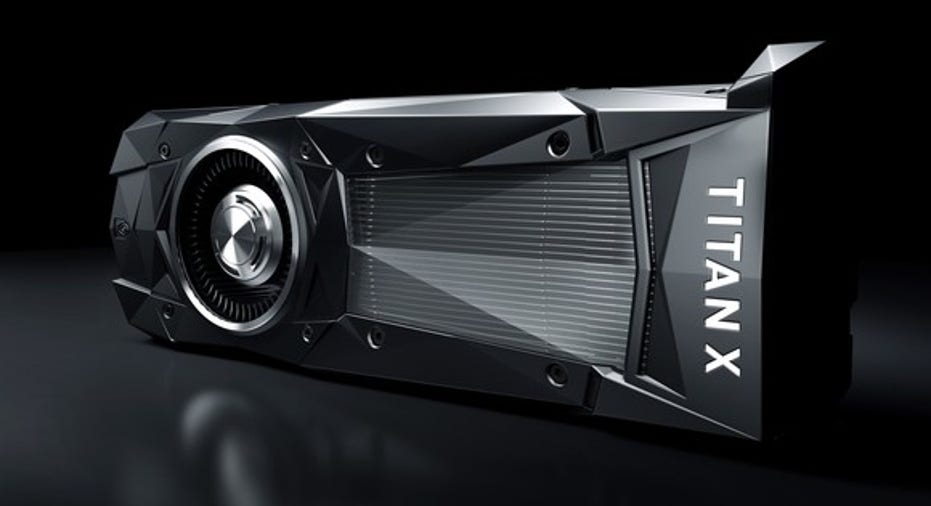NVIDIA Corporation Volta Architecture Rumor Emerges

In May 2016, graphics specialist NVIDIA (NASDAQ: NVDA) began to roll out new graphics processors based on a new architecture that it calls Pascal.
NVIDIA's Titan X graphics card uses a chip manufactured by TSMC. Image source: NVIDIA.
NVIDIA contracts with Taiwan Semiconductor Manufacturing Company (NYSE: TSM) to manufacture most of the Pascal-based graphics chips, from mid-range gaming all the way through data center-oriented chips, using a technology called 16-nanometer FinFET+, and it relies on Samsung (NASDAQOTH: SSNLF) to manufacture the lowest-end Pascal-based chips using a technology called 14-nanometer low power plus.
There has been some speculation on what manufacturing technology NVIDIA will use to manufacture its next-generation Volta architecture-based products. A while back, Fudzilla reported that Volta, like Pascal, will be manufactured in TSMC's 16-nanometer technology.
This rumor made sense, considering Volta is probably going to be launched too early to be manufactured on TSMC's 7-nanometer technology, and it's unlikely that NVIDIA would use TSMC's 10-nanometer technology for high-performance graphics processors, as the 10-nanometer technology is widely viewed as a "stop-gap" technology aimed squarely at mobile processors.
A new rumor just cropped on the Beyond3D Forums about the manufacturing technology that NVIDIA will use for the Volta chips that seems to make a lot of sense. Let's take a closer look at it.
What's in a name?
According to Beyond3D user xpea, Volta is rumored to be manufactured on a "custom TSMC 12-[nanometer] process." The user also adds that "a lot of wafers [are] already allocated" for the product ramp-up.
So what exactly is a 12-nanometer process?
DigiTimes first reported the existence of this technology, claiming that it is a "smaller version" of TSMC's 16-nanometer technology. On TSMC's most recent earnings call, management confirmed that it's working on an enhanced version of its 16-nanometer technology that delivers better performance, power consumption, and chip area -- though it wasn't clear whether TSMC will market the technology as "12-nanometer."
Does this make sense?
With Volta, NVIDIA is likely to make significant improvements to the underlying design of its graphics architecture. In other words, independent of the manufacturing technology used to build the Volta chip, Volta should offer a solid enhancement from Pascal.
However, if NVIDIA has access to an improved manufacturing technology to build the Volta chips, then it should be able to deliver even better performance and power consumption -- enhancing the fundamental architectural gains.
TSMC hasn't yet stated what kinds of improvements it expects to deliver with this next-generation "12-nanometer" technology, but the more substantial they are, the better it'd be for NVIDIA's Volta products -- assuming, of course, this rumor is true.
Might TSMC win back some NVIDIA share from Samsung?
Right now, TSMC has the lion's share of NVIDIA's Pascal units, but that share position isn't 100%. It will be interesting to see if TSMC can improve its share of NVIDIA's graphics processors during the Volta generation. Indeed, to do so, TSMC would need only win the manufacturing contract to build the lowest-end Volta chips.
Such a win wouldn't be a fundamental game changer for TSMC's financial position, but it could signal a further improvement in the chipmaker's competitive positioning and a strengthening of its relationship with NVIDIA.
10 stocks we like better than Taiwan Semiconductor Manufacturing When investing geniuses David and Tom Gardner have a stock tip, it can pay to listen. After all, the newsletter they have run for over a decade, Motley Fool Stock Advisor, has tripled the market.*
David and Tom just revealed what they believe are the 10 best stocks for investors to buy right now... and Taiwan Semiconductor Manufacturing wasn't one of them! That's right -- they think these 10 stocks are even better buys.
Click here to learn about these picks!
*Stock Advisor returns as of January 4, 2017
Ashraf Eassa has no position in any stocks mentioned. The Motley Fool owns shares of and recommends Nvidia. The Motley Fool has a disclosure policy.



















